
The easiest way to fix “ntdll.dll” crash issue
Remove malware threats
Restore max performance
Replace damaged windows files
And more!
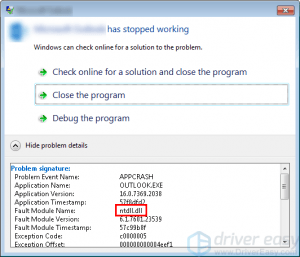
Recently, many Windows users have reported their programs sometimes crash with the ntdll.dll error. Some of them bump into this error when opening or closing a program, while others encounter this issue just when the program is running. It is really annoying!
What is ntdll.dll?
The file ntdll.dll is a DLL (Dynamic Link Library) file stored in the system folder of Windows operating system. It is usually created automatically during the installation of the Windows operating system. The file ntdll.dll has a description of “NT Layer DLL”. The file ntdll.dll contains NT kernel functions, so it is essential for the normal function of the Windows operating system.
Since the file ntdll.dll can be accessed by more than one program at a time, and the ntdll.dll crash issue occurs on any Windows operating system including Windows 7, Windows 8, Windows 10 and Windows 10, it is difficult to narrow down the causes of the crash.
However, the good news is you can easily fix it with the methods below. You don’t have to try them all; just work your way down the list until you find the one that works for you:
Try these fixes
Here’s a list of fixes that have resolved this problem for other users. You don’t have to try them all. Just work your way through the list until you find the one that does the trick for you.
- Restore the ntdll.dll file
- Update your Windows system
- Run the Program Compatibility Troubleshooter
- Disable the problematic add-ons of your Internet Explorer
- Reinstall the problematic program
- Run the DISM tool
- Run the System File Checker
- Replace the file ntdll.dll from trustworthy source
- Repair system files automatically
- Pro tip: Update your drivers
Note: The screenshot below has been taken from a Windows 10 operating system. If you are using Windows 11, please be aware that the visual appearance of your screen may vary slightly, but the steps to perform the task remain consistent.
Fix 1: Restore the ntdll.dll file
You can fix this issue by restoring the ntdll.dll file from a trustworthy source. If you’re not sure which software you can trust, it’s recommended that you try the DLL-files.com Client.
With the DLL-files.com Client, you’ll be able to fix your DLL error in one click. You don’t have to know Which version of Windows system is running on your computer, and you don’t need to worry about downloading the wrong file. The DLL-files.com Client handles it all for you.
To restore the ntdll.dll file with the DLL-files.com Client:
1) Download and install the DLL-files.com Client.
2) Run the Client.
3) Type “ntdll.dll” in the search box and click the Search for DLL file button.
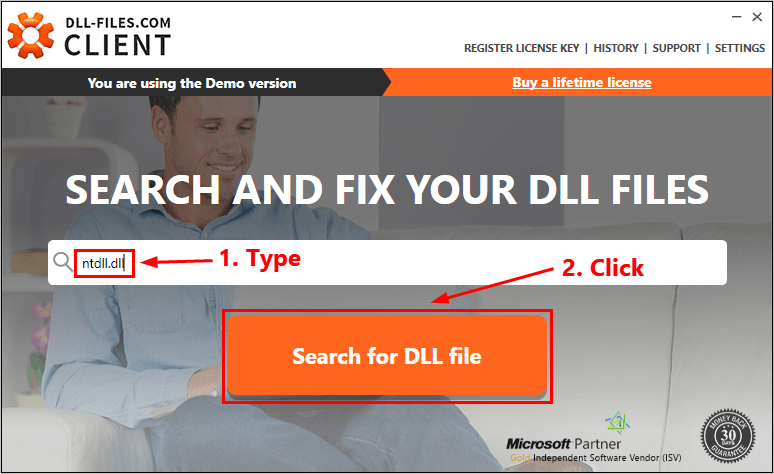
4) Click ntdll.dll.
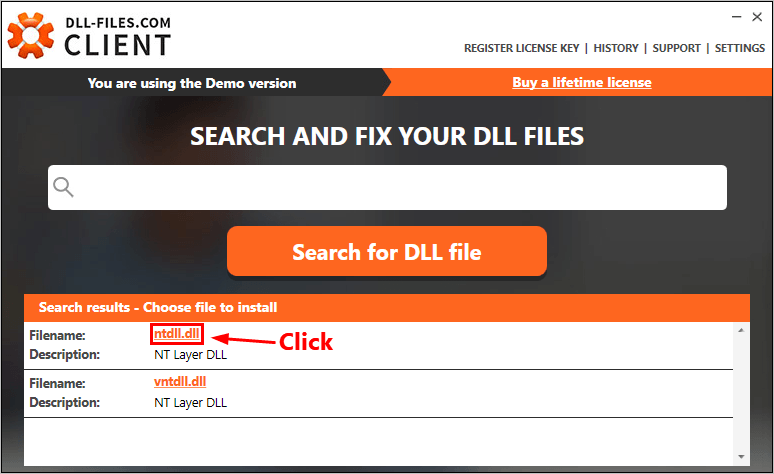
5) Click the Install button. (You’re required to register the program before you can install this file — you’ll be prompted when you click Install.)
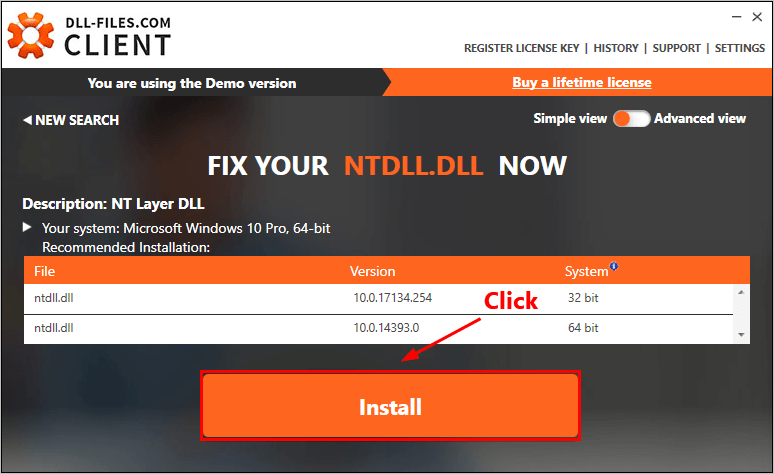
Check to see if you resolve this issue. If not, try the next fix, below.
Fix 2: Update your Windows system
If this error still appears, check if there are any new Windows-related patches or service packs available. The DLL error might be caused by an outdated Windows operating system. Try updating your Windows system and this issue may get resolved. Here is how to do it:
1) On your keyboard, press the Windows logo key and type update. In the list of results, click Check for updates to open Windows Update window.
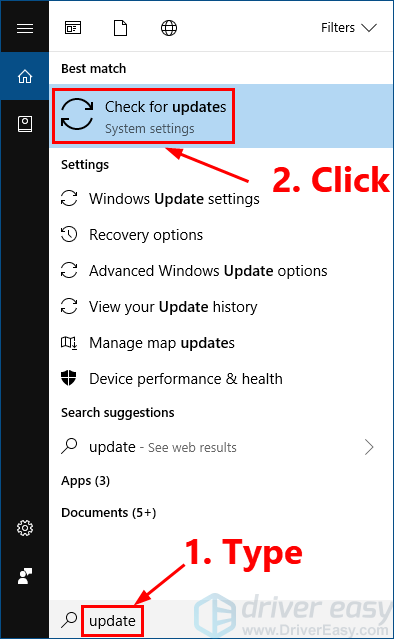
2) Click the Check for updates button to update your Windows system.
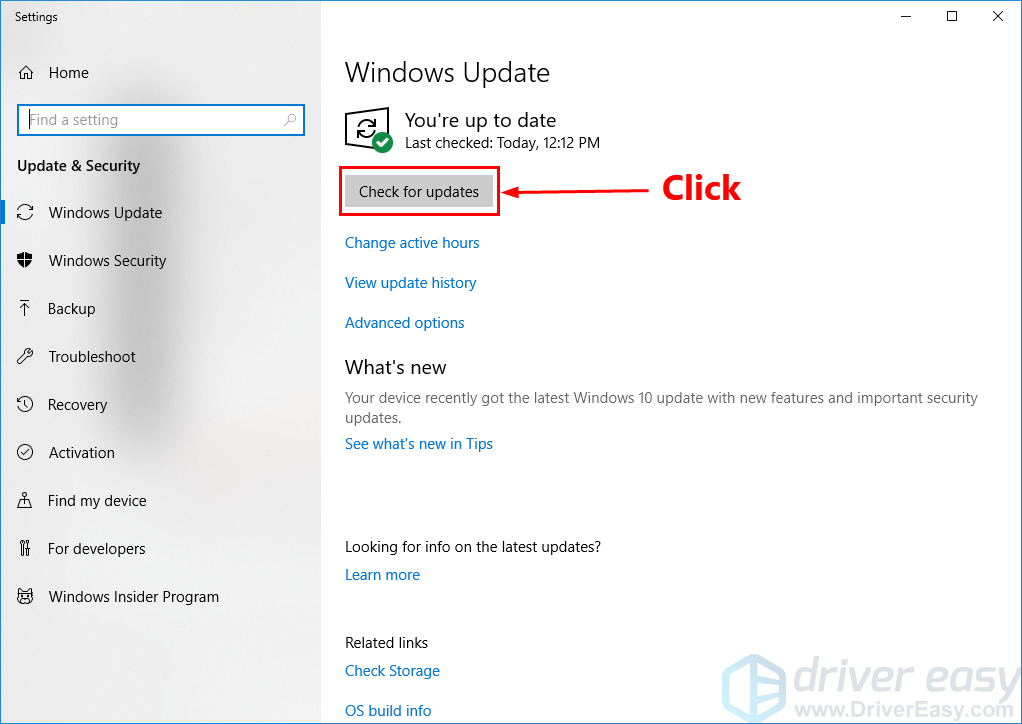
3)Restart your PC when the Windows update process is completed.
If this fix works, your program won’t crash with the ntdll.dll error again.
Fix 3: Run the Program Compatibility Troubleshooter
This issue may also be triggered by a poorly written program. If your program crashes with the ntdll.dll error when opening or closing a program, or just when a program is running, it’s time to run the Program Compatibility Troubleshooter.
The Program Compatibility Troubleshooter can check whether that program is compatible with your current Windows operating system or not. Just follow the steps to run the Program Compatibility Troubleshooter:
1) Right-click the shortcut of the problematic program on your desktop and select Properties.
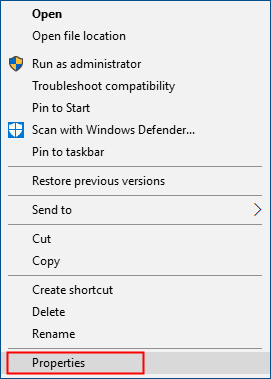
2) Click the Compatibility tab and click Run compatibility troubleshooter.
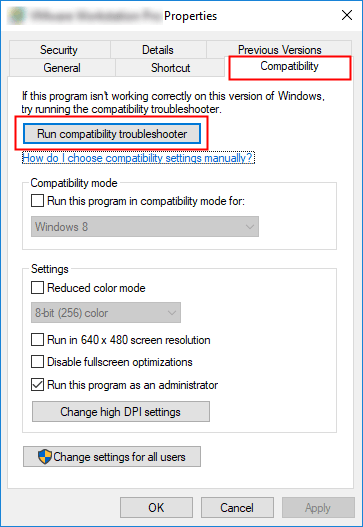
3) Click Try recommended settings to test-run the program using recommended compatibility settings. Follow the on-screen instructions to see whether this troubleshooting option works or not.
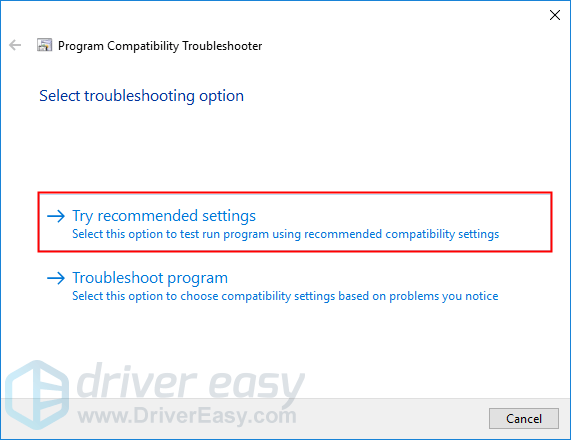
4) If it still doesn’t work, then run the compatibility troubleshooter again and select the second option to choose compatibility settings based on problems you notice.
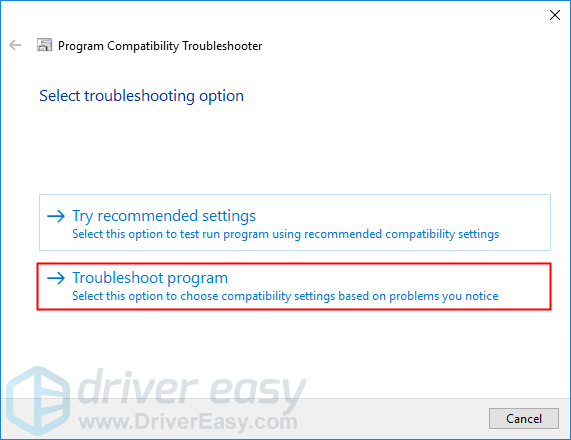
5) If the problem persists, adjust the following settings manually and select OK when you’re done.
- Compatibility mode: If your program is not designed for your current Windows system, the program may crash with the ntdll.dll error. Click the drop-down list to select a previous version of Windows system to test run the program.
- Run this program as an administrator: If the program is not given administrator privileges, it may not run properly and may even crash with the ntdll.dll error. Try this setting to give the program the administrator privileges.
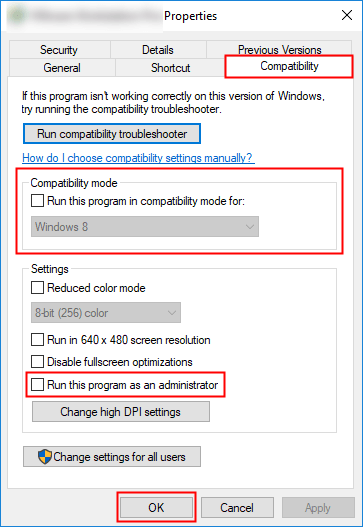
If this fix works, your program won’t crash with the ntdll.dll error.
Fix 4: Disable the problematic add-ons of your Internet Explorer
If your Internet Explorer often crashes with the ntdll.dll error, this issue is probably caused by the IE add-ons. Try selectively disabling the add-ons of your Internet Explorer one by one until you find the add-on that causes this issue. Here is how to do it:
1) Open your Internet Explorer, then click the gear button to select Manage add-ons.

2) Select the first add-on in the list and then click Disable.
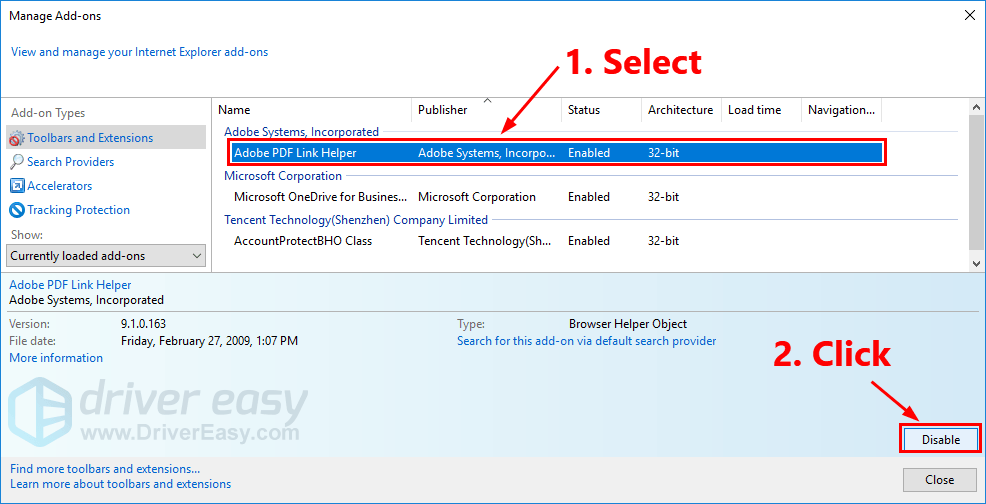
3) Close your Internet Explorer and reopen it to see whether this issue persists. If so, repeat step 2 to disable the rest of your add-ons one by one until you find the add-on that causes this issue.
4) Disable or delete the problematic add-on.
Reopen your Internet Explorer to see if this problem reappears. If not, this issue is fixed. If this issue persists, try the next solution.
Fix 5: Reinstall the problematic program
If this issue occurs when you open or close a certain program, or when that program is running, try to reinstall that problematic program and maybe the ntdll.dll error will be resolved.
1) On your keyboard, press the Windows logo key and R at the same time to open the Run dialog. Type control and press Enter to open the Control Panel.
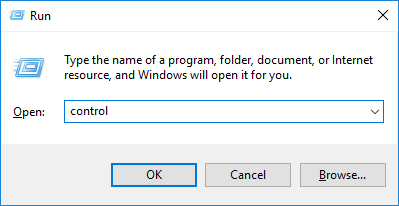
2) View the Control Panel by Category and select Uninstall a program.
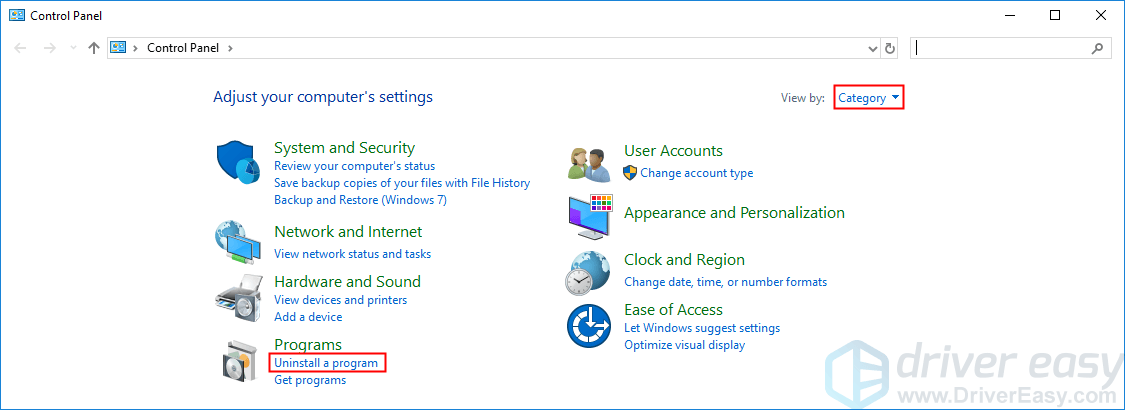
3) Right-click your problematic program and select Uninstall.
4) Restart your PC and then download the installation package of the problematic program from its official website.
5) Double-click the installation package to install the program.
Now run the program to see whether your program will crash with the ntdll.dll error or not. If this issue reappears, you can consult the software provider for a solution.
Fix 6: Run the DISM tool
This annoying issue is probably caused by the corrupted Windows system files. In this case, running the Deployment Image Servicing and Management (DISM) tool may resolve this issue.
Just follow the step-by-step instructions to run the DISM tool:
1) On your keyboard, press the Windows Logo Key and R at the same time to open the Run dialog. Type cmd and then press Ctrl, Shift, and Enter on your keyboard at the same time to run the Command Prompt as administrator. You will be prompted for permission. Click Yes to run the Command Prompt.

2) On your keyboard, type the command lines below one by one and press Enter:
Dism /Online /Cleanup-Image /ScanHealth

Dism /Online /Cleanup-Image /CheckHealth

Dism /Online /Cleanup-Image /RestoreHealth

3) Close the Command Prompt when the restore operation is completed.

See if this issue persists. If so, try running the System File Checker.
Fix 7: Run the System File Checker
The System File Checker can scan for corruptions in Windows system files and restore corrupted files. When this annoying issue appears, it may be caused by some corruption error. In this case, running System File Checker may help you resolve this issue.
Here is how to do it:
1) On your keyboard, press the Windows Logo Key and R at the same time to open the Run dialog. Type cmd and then press Ctrl, Shift, and Enter on your keyboard at the same time to run the Command Prompt as administrator. You will be prompted for permission. Click Yes to run the Command Prompt.
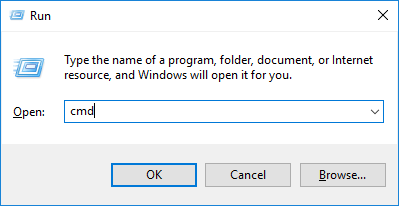
2) On your keyboard, type the command lines below and press Enter:
sfc /scannow

3) Close the Command Prompt when this command operation is completed.
See if this issue reappears. If this fix works, then you won’t see this error. If not, you may need to replace the file ntdll.dll from a trustworthy source.
Fix 8: Replace the file ntdll.dll from trustworthy source
Another fix to deal with the ntdll.dll crash issue is to replace the file ntdll.dll from the original or legitimate source. You can copy the file ntdll.dll from another trustworthy computer running the same version and edition of the Windows operating system.
1) On your keyboard, press the Windows Logo key and R at the same time to open the Run dialog. Type cmd and press Enter to open Command Prompt.

2) Type the command line systeminfo and press Enter to view your system type.

3) Based on your system type, copy the file ntdll.dll from another trustworthy computer running the same version and edition of the Windows operating system and paste it to your own Windows operating system.
4) On your keyboard, press the Windows Logo Key and R at the same time to open the Run dialog. Type cmd and then press Ctrl, Shift and Enter on your keyboard at the same time to run the Command Prompt as administrator. You will be prompted for permission. Click Yes to run Command Prompt.
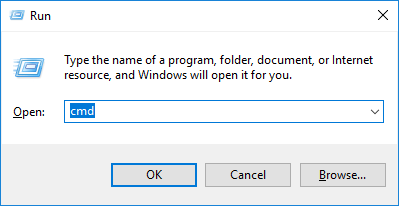
5) Type the Command line regsvr32 ntdll.dll and press Enter.

6) Restart your PC.
See if this issue persists. Normally, this issue will be fixed after you replace the file ntdll.dll from a trustworthy source.
Fix 9: Repair system files automatically
If you don’t have the time, the patience or you’re not comfortable playing with the command line, don’t worry. A professional tool like Fortect can do the job for you.
As a professional Windows repair tool, Fortect boasts powerful technology that secures and safely repairs your PC to an optimized state. With just one click, Fortect will scan and detect faulty system files on your PC, then automatically replace those damaged or missing Windows files with healthy new ones!
Most importantly, Fortect can fix the ntdll.dll file crashing issue easily, so you don’t have to reinstall Windows OS, and you won’t lose any personal data or settings.
- Download and install Fortect.
- Open Fortect and run a free scan. Once done, Fortect will give you a robust report of your PC status.

- To fix the issues detected, you just need to click Start Repair. (You’ll need to buy the full version. It comes with a 60-day Money-Back Guarantee so you can refund anytime if Fortect doesn’t fix your problem).
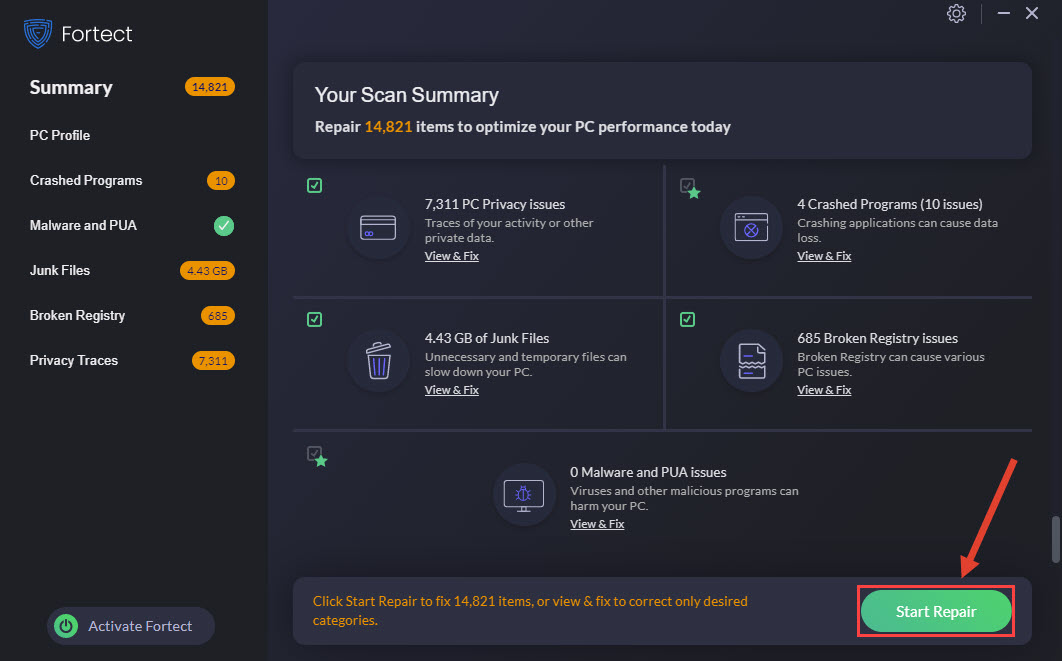
Pro tip: Update your drivers
If there are outdated or missing drivers on your PC, it is a good idea to update your drivers to the latest version, since by doing that, you can avoid many computer issues.
There are two ways to do it: manually and automatically.
Update your sound card driver manually – You can update your drivers manually by going to the manufacturer’s website and searching for the latest driver for your device.
Or
Update your drivers automatically – If you don’t have the time, patience or computer skills to update your drivers manually, you can, instead, do it automatically with Driver Easy.
You don’t need to know exactly what system your computer is running, you don’t need to risk downloading and installing the wrong driver, and you don’t need to worry about making a mistake when installing. Driver Easy handles it all.
1) Download and install Driver Easy.
2) Run Driver Easy and click the Scan Now button. Driver Easy will then scan your computer and detect any problem driver.
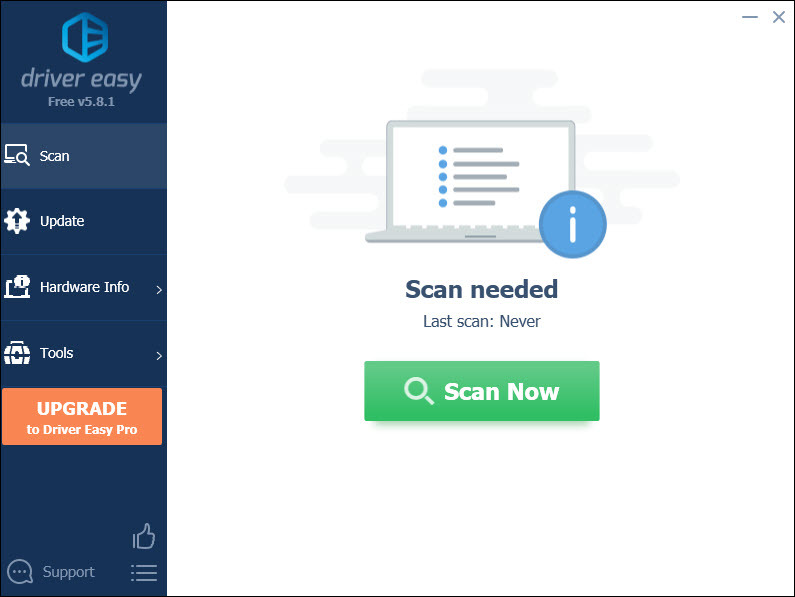
3) Click Update next to your device to automatically download the correct version of its driver, and then you can install it manually. Or click Update All to automatically download and install the correct version of all the drivers that are missing or out of date on your system (This requires the Pro version – you’ll be prompted to upgrade when you click Update All. You get full support and a 30-day money back guarantee).
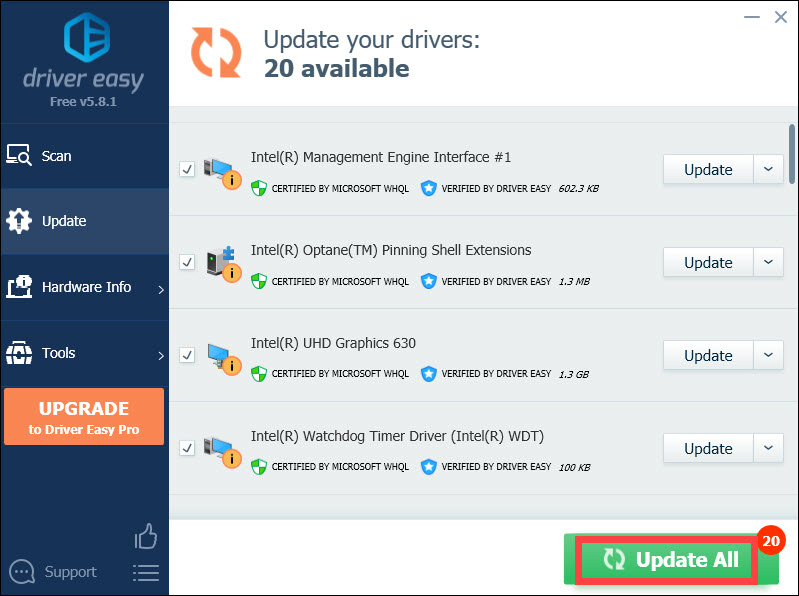
Hopefully one of the fixes above resolved this issue! If you have any questions or suggestions, please leave us a comment below.



